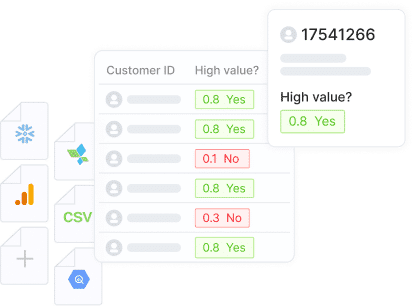In a nutshell:
- Predictive analytics is reshaping project management by offering foresight and control.
- It enhances project planning, resource allocation, and risk management through data insights.
- Tools like Pecan AI streamline predictive modeling.
- Best practices include data collection, integration of tools, and training for effective utilization.
- Future trends include advanced predictive modeling, AI integration, and agile project management.
In the complex world of project management, success often hinges on the ability to anticipate challenges, allocate resources efficiently, and make data-driven decisions. Traditional approaches, while valuable, can sometimes fall short in the face of increasingly complex projects and dynamic business environments. Enter predictive analytics – a powerful tool that's reshaping the landscape of project management and offering a new level of foresight and control.
Project managers have long relied on their experience, intuition, and historical data to guide their decision-making process. However, as projects become more intricate and data more abundant, there's a growing need for more sophisticated tools to navigate these complexities. Predictive analytics answers this call by leveraging advanced algorithms and machine learning to transform raw data into actionable insights.
Imagine being able to foresee potential roadblocks before they materialize, optimize resource allocation with pinpoint accuracy, and make real-time adjustments based on data-driven predictions. This isn't a far-off dream – it's the reality that predictive analytics brings to project management today. By harnessing the power of data, project managers can now move beyond reactive problem-solving to proactive strategy implementation.
In this article, we'll explore how predictive analytics is revolutionizing project management, from enhancing risk assessment to streamlining resource allocation. We'll delve into the tangible benefits it offers, examine real-world applications, and look at best practices for implementation. Let's discover how predictive analytics is setting a new standard for project management excellence.
Benefits of Predictive Analytics in Project Management
Predictive analytics introduces a level of foresight and intelligence to project management that businesses previously deemed impossible.
Improved Project Planning Through Data Insights
The beauty of predictive analytics is that it deals with real-time information and historical data. By analyzing past data, predictive models can highlight trends, patterns, and correlations that might have gone unnoticed. This feature immensely aids the project planning phase.
With data-driven insights, project managers can make informed decisions about the project's scope, budget, timeline, and other critical elements. Predictive models can highlight potential obstacles and suggest mitigation strategies long before the problems arise. This proactive approach helps develop a realistic project plan, significantly reducing the chances of unexpected setbacks.
Efficient Resource Allocation Using Predictive Models
One of the critical aspects of project management is the optimal utilization of resources. Predictive analytics can revolutionize this process by predicting the demand for different resources throughout the project lifecycle. This forecast can be based on the project's complexity, timeline, past resource utilization patterns, etc.
Project managers can allocate and reallocate resources more efficiently by accurately predicting the resource needs. This not only helps to maximize resource usage but also minimizes waste, saving both time and money.
Enhanced Risk Management With Predictive Analytics
Risk management is another area where predictive analytics can shine. As the name suggests, this tool can predict potential risks by identifying patterns and anomalies in the data.
Project managers can use these insights to take preventive measures and develop contingency plans. Moreover, predictive analytics estimates the risk impact, allowing managers to prioritize risks and focus their efforts on the ones that could have the most significant project implications. This proactive risk management approach results in fewer surprises and more successful projects.
The introduction of predictive analytics into project management elevates it. The dynamic nature of project management becomes less daunting and more manageable when equipped with the power of predictive analysis.
Application of Predictive Analytics in Project Management
The versatility of predictive analytics in project management is impressive, and its implementation enhances project outcomes remarkably. Various applications of predictive analytics and the tools help to facilitate this process.
Utilizing Predictive Analytics Tools Like Pecan AI
Implementing predictive analytics in project management isn't as daunting as it may seem, especially with tools like Pecan AI at your disposal. Pecan AI, an automated predictive analytics tool, can streamline predictive modeling, enabling project managers to leverage data insights effectively.
Pecan AI capitalizes on machine learning and artificial intelligence to analyze data, providing accurate predictions for your projects. It identifies patterns and trends in your data, allowing you to anticipate potential risks, understand resource needs, and plan your projects more meticulously.
Implementing Predictive Models in Project Management Systems
Integrating predictive models into project management systems can facilitate more informed decision-making. By analyzing historical data, project managers can gain insights into how different parameters might influence project outcomes.
Driving resource allocation, evaluating progress, assessing risk probability, and determining timelines are some areas where these predictive models prove invaluable. Using predictive models in your project management systems allows for continuous monitoring and adjustment of plans based on data, enhancing the efficiency and effectiveness of project outcomes.
Applying predictive analytics in project management transforms the project planning and execution process. Project managers can significantly increase their project's success rate through the right tools and correct implementation of predictive models. With predictive analytics, the future of project management is data-driven, proactive, and highly efficient.
Best Practices for Implementing Predictive Analytics in Project Management
For organizations to truly benefit from predictive analytics in project management, it is essential to follow some best practices. Establishing a systematic approach to collecting and analyzing data, integrating predictive analytics tools with project management systems, and providing training for effective utilization are crucial steps in successfully implementing predictive analytics.
Data Collection and Analysis for Predictive Modeling
The relevance of the predictions generated by predictive analytics largely depends on the quality and volume of the data fed into the system. Establish a systematic approach to data collection and analysis. The data should be as diverse and comprehensive as possible, covering all aspects of project management.
Project managers should also consider the need for data cleansing to ensure data accuracy. Data cleaning involves identifying, correcting, or removing errors or inaccuracies in datasets. The more accurate the data, the more accurate the predictions will be. Furthermore, ongoing data analysis is essential to update predictive models and improve their accuracy.
Integration of Predictive Analytics Tools With Project Management Systems
Businesses must integrate predictive analytics tools with project management systems to provide real-time insights and facilitate data-driven decisions. Integration allows for automated data sharing between systems, enabling project managers to have the most current and accurate data for their predictive models.
For the integration to be successful, the predictive analytics tool must be compatible with the project management system and vice versa. Choosing the right tools that suit your project management needs and can seamlessly integrate is vital.
Training and Skill Development for Effective Utilization
Implementing predictive analytics in project management may require certain data analytics and interpretation skills. Therefore, organizations should invest in training and skill development for project managers.
Understanding the basics of predictive modeling, data analysis, and interpretation will enable project managers to use predictive analytics tools effectively. They can then make more informed decisions, ensure efficient resource allocation, and enhance risk management, improving the project outcomes.
Overcoming Challenges in Adopting Predictive Analytics for Project Management
As transformative as predictive analytics can be for project management, the implementation process has challenges. Recognizing and addressing these obstacles proactively helps businesses avoid common pitfalls and utilize predictive analytics capabilities.
Addressing Data Quality and Integrity Issues
One of the primary challenges in adopting predictive analytics for project management is ensuring data quality and integrity. Maintain clean and accurate data source as the accuracy of predictive models relies heavily on the quality of data.
Some common data integrity issues include inconsistent data formats, missing information, and duplicate entries. These issues can skew the predictive models, leading to inaccurate predictions. Businesses should perform regular data cleansing and verification to maintain data integrity.
Maintaining data privacy and security is equally important. Businesses should adhere to all relevant data protection laws and regulations, ensuring the safe handling and storage of data.
Managing Resistance to Change Within Project Teams
Change, especially involving new technology, can sometimes meet resistance within project teams. Project managers, who are used to traditional management techniques, may find it challenging to adapt to a new, data-driven approach.
To address this, organizations should educate their teams about the benefits of predictive analytics and how it can make their tasks easier and more efficient. Create an environment where employees feel safe to learn, ask questions, and adapt. Training and support can ease the transition, ensuring team members have the necessary skills to leverage predictive analytics.
The challenges in adopting predictive analytics for project management are undeniable. Yet, with the right approach, businesses can overcome these hurdles, paving the way for a more efficient, data-driven project management process. Despite the initial challenges, predictive analytics is indeed the instrument that can take your project management to the next level. It's a worthwhile investment as the benefits far outweigh these initial obstacles.
Future Trends and Innovations in Predictive Analytics for Project Management
Predictive analytics is rapidly evolving, with emerging technologies and tools continually enhancing its potential. The future of predictive analytics in project management appears promising, with trends signaling a shift towards more advanced predictive modeling and the integration of artificial intelligence (AI) and machine learning.
Emerging Technologies and Tools for Advanced Predictive Modeling
As we look to the future, there is growing excitement about the potential for more advanced predictive modeling. Emerging technologies and tools offer a more powerful, precise, and automated predictive analysis.
For example, augmented analytics leverage AI and machine learning to automate data preparation, insight discovery, and insight sharing. Businesses can use predictive analysis much more quickly and easily, and uncover even more useful insights from data.
Potential Impact of AI and Machine Learning on Project Management
Artificial Intelligence (AI) and machine learning technologies are set to revolutionize project management, with huge potential for improving predictive analytics.
AI and machine learning algorithms can process vast amounts of data quicker than humans and learn and adapt over time. This means they can identify trends, patterns, and correlations that human analysis might have missed, offering even deeper insights for project planning, resource allocation, and risk management.
Indeed, integrating AI and machine learning with predictive analytics makes project management more efficient, precise, and responsive. Project managers can rely on these advanced analytics tools to make more informed decisions and react quickly to changes and risks.
Predictive Analytics and Agile Project Management
An exciting trend in the realm of project management is the integration of predictive analytics with agile methodologies. Agile project management, known for its flexibility and adaptability, can greatly benefit from predictive analytics.
Predictive analytics, with its data-driven insights, can further enhance the agility of project management. It can provide valuable data to identify potential bottlenecks or issues during the iterative development process, allowing project managers to take immediate action, thereby preventing delays or setbacks. It can also help in managing the constantly changing priorities in agile environments by dynamically allocating resources based on project needs, predicting demand patterns, and responding effectively to any changes in the project scope.
The combination of predictive analytics and agile project management provides a powerful mix of data-driven foresight and flexibility, making project management more responsive and effective.
Increasing Excellence With Predictive Project Managementq
The value of predictive analytics in project management is undeniable. It drives improved project planning, more efficient resource allocation, enhanced risk management, and ultimately, better project outcomes.
Business leaders need to recognize this value and move towards embracing predictive analytics in their project management processes. The initial challenges of data quality and integrity, and potential resistance to change, can diminish with effective strategies and support.
Are you ready to revolutionize your project management process with predictive analytics? Put your business ahead of the curve and leverage this remarkable tool for your project management.
Learn more about how Pecan AI can streamline your project management process with powerful predictive analytics. Schedule a demo today, and see the power of predictive analytics in action.










